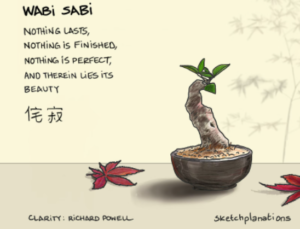An Introduction to Wabi-Sabi

An Introduction to Wabi-Sabi: A Japanese concept you’ve likely never heard of but should know about!
By: Heather Anderson
“Wabi-sabi acknowledges three simple realities: nothing lasts, nothing is finished, and nothing is perfect.” Wabi-sabi is a Japanese concept, quoted here by Richard Powell, author of Wabi-Sabi Simple, which caught my attention as I flipped through a magazine while creating collages with a client the other day. As a former perfectionist, reading these words struck a nerve initially. However, the more I learned about the wabi-sabi philosophy, the more I began to see its appeal.
Along with the Powell quote, an article titled “The Wabi-Sabi Self,” written by Jessie Sholl explained that the concept of wabi-sabi has its roots in the traditional Japanese tea ceremony. Therefore, it is sometimes explained through a well-loved teacup, made by an artist’s hands, cracked, or chipped by its use, and is seen as assets rather than flaws. The author of Simply Imperfect, Robyn Griggs Lawrence, explains that wabi-sabi is the complete acceptance of finding beauty in things as they are.

Origins
Beth Kempton, author of Wabi Sabi: Japanese Wisdom for A Perfectly Imperfect Life, explains that wabi-sabi originated as two separate words. The word wabi means ‘subdued taste.’ Wabi is about the beauty in simplicity and spiritual richness and serenity in detaching from the material world. The word sabi means ‘antique look.’ Sabi is more concerned with time, how all things grow and decay, and how aging alters the visual nature of those things. The conjoined term, wabi-sabi, goes beyond the beauty of any given object or environment to refer to one’s response to that profound feeling. Wabi-sabi is a feeling, and it is intangible. One person’s wabi-sabi is not the same as another’s because each person experiences the world differently.
Life Lessons
According to Kempton, the life lessons wabi-sabi can teach us includes the following:
- The world looks very different when you learn to see and experience it from your heart.
- All things are impermanent, incomplete, and imperfect. Therefore, perfection is impossible, and imperfection is the natural state of everything, including ourselves.
- There is great beauty, value, and comfort to be found in simplicity.
Accepting imperfection does not mean lowering your standards. Instead, it means not judging yourself for being imperfect. This notion is reminiscent of the message in the Bruno Mars song ‘Just the Way You Are’ when he sings, “‘Cause you’re amazing, just the way you are.” Except instead of Bruno Mars saying this to you, you’re saying it to yourself.
Wabi-sabi permits you to be yourself. It inspires you to do your best but not make yourself sick in pursuing an unattainable goal like perfection. It encourages you to relax, slow down, and enjoy life.
Exercises
You can incorporate the wabi-sabi into your life with exercises in simplicity, mindfulness, and acceptance.
Try simplifying your life by asking yourself questions like: How do you feel about your physical space? What do you own more of than you need? If you could let go of one thing (material or otherwise), what would it be? What difference would that make? What else could you simplify?
Try adding mindfulness practice to your daily routine by taking a few minutes to focus on your breathing, body sensations, or emotions. Headspace is a simple way to get started if you are new to mindfulness because there is a free Basics course that will teach you the essentials.
Try increasing acceptance by reflecting on your life story, including all of its ups and downs. Bring your attention to the moments of joy, learning, and transformation you’ve experienced. Recognize the challenges you’ve overcome and the strengths that allowed you to do so.
The philosophy of wabi-sabi has helped this former perfectionist appreciate being “perfectly imperfect,” and I hope it can help you too!

